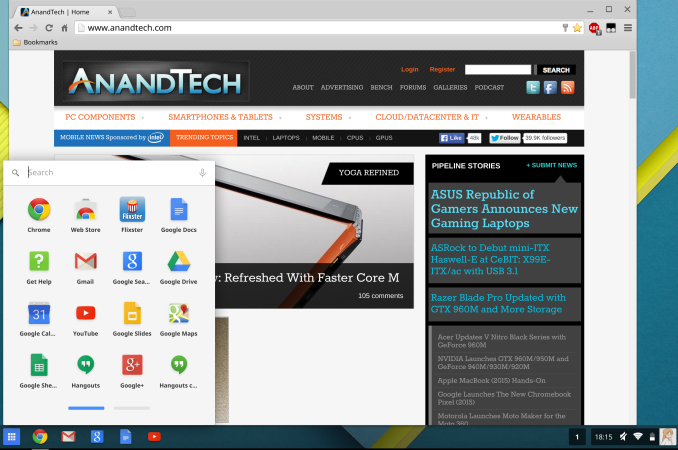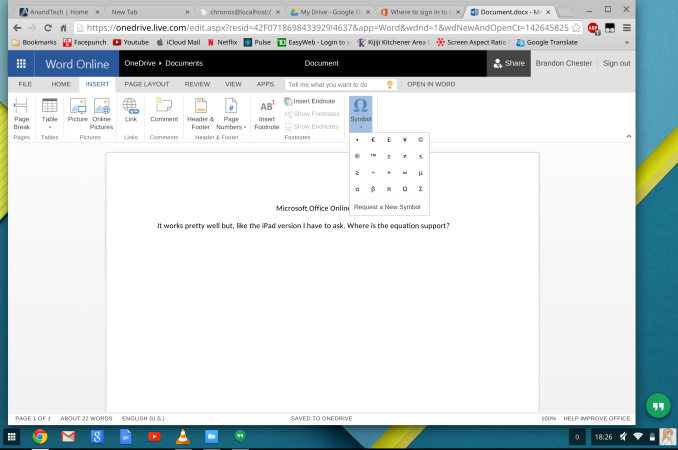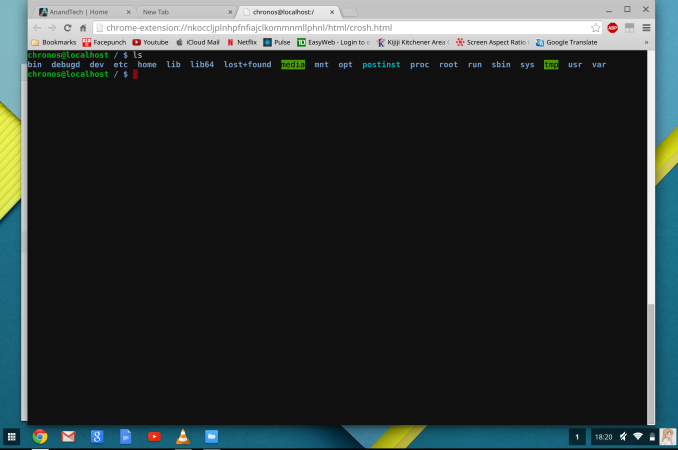The Chromebook Pixel (2015) Review
by Brandon Chester on March 16, 2015 8:00 AM EST- Posted in
- Laptops
- Chrome OS
- Chromebook
- Chromebook Pixel
Software
To tell the truth, I hadn't had much experience with Chrome OS before using the Chromebook Pixel. Years ago I installed Chromium OS to see what it was like, but I quickly wrote it off as far too limited to perform the tasks that I do on a daily basis. Since then, web applications have improved immensely, and Chrome OS itself has had new applications added and changes made to the interface to make it feel more like a typical operating system. But at its heart, it's still just Chrome and web apps, and so it was interesting to see what could be done within those bounds.
When you first get your Chromebook you'll be asked to log into your Google account. From that point, you're sent right to what could be called the home screen for Chrome OS. At the bottom you have a shortcut to Chrome, along with shortcuts to other Google products like Docs and Gmail which are actually just links to the website for each respective product. However, not all Chrome OS applications run within Chrome. There's a Calculator application which greatly resembles the Android Lollipop calculator, and a Files application to view your removable storage and downloads in addition to showing your files stored in Google Drive.
At this point you're basically ready to go. There aren't many settings to change or any applications to configure once you've signed in with your Google account. In fact, if you're already invested in Google's ecosystem you'll be able to start editing your Google Docs files and access your Google Drive immediately. I do use Google drive, but I use Microsoft Office instead of Google Docs, Sheets, and Slides for editing documents which could pose a problem. Luckily, Office has moved to the cloud and so users who don't edit their documents using Google's software aren't left out in the cold.
Unfortunately, many cloud counterparts to desktop software are missing important features. In the case of Office, you lose many formatting tools, including the ability to insert equations which is a tool I use frequently. Charts and text boxes are also removed in the cloud version of Word. I understand the need to simplify these applications when they're being run in a web browser, but it doesn't change the fact that many tools users expect to be there are missing.
How Google's office application handle files can also be somewhat problematic. I'm sure most people have been sent a file in one of Microsoft's Office formats at some point in their lives. Google claims somewhere around 90% feature compatibility with Microsoft Office files. On one hand, this is pretty impressive for software that runs in a web browser. But on the other hand, when you only have 90% feature compatibility, you're basically completely incompatible with every file that uses any feature from that last ten percent. Importing a PowerPoint file to Google Slides will cause objects like charts to just be completely erased, and I would hardly consider the use of charts in PowerPoint presentations to be uncommon.
For media playback, the default video and music applications are more than sufficient for most users. Google even has support for the Matroska container which is more than can be said for other operating systems. For playing back less common file types, or videos with subtitles, the built in players aren't quite up to the task. Luckily, the Android version of VLC is slated to come to Chrome OS in the near future via the App Runtime for Chrome. Google was able to provide me with a debug version to see how well it worked. It definitely needs some polish, but there's still quite some time between now and release, and I don't know how up to date the debug build I'm using is.
Overall, I think that Chrome OS still does a pretty good job of handling files that come from a Windows PC world. There's still work to be done though, and anybody who's considering the Pixel or any other Chromebook should understand what they're getting into.
For users who want to play around with the underlying Linux core of Chrome OS, there's a fully functional shell which is accessible via Chrome after putting the laptop into developer mode. This allows you to access more of the file system, and you can even install versions of Ubuntu or Debian using Crouton. Obviously I can't recommend doing so due to the potential security and stability risks, but the options are available for any users who are interested. The Chrome OS shell already has the ability to connect to another computer via SSH once developer mode is enabled, and it opens up a whole new world of possibilities for the Pixel.
I'm definitely more open to using Chrome OS than I was when the original Pixel launched. I know that many users would be able to do everything they currently do on Windows with a Chromebook. However, those users aren't likely to be the ones who are looking for a $1000 laptop. For me personally, Chrome OS is still too limited, and it will probably always be too limited for me to use as a primary operating system. But it's an interesting idea, and with Google working with developers to get Android applications brought over to Chrome OS there's no telling what the state of Chrome OS will be by the time a Pixel v3 rolls around.














123 Comments
View All Comments
Sushisamurai - Monday, March 16, 2015 - link
Just nit picking, but for the battery / charge time section, I think you should add a chart for normalized values, to compare efficiency - I think it'd be neat to see how efficient these new laptops are getting (it's the new trend!)Sushisamurai - Monday, March 16, 2015 - link
But yeah, cool read. If it didn't have chrome book logo written on it, i think I might just mistake the keyboard/trackpad design for a Macbook design. The body could use some contours IMO. That LED light bar is a novel ideaandychow - Monday, March 16, 2015 - link
My only real complaint is the lack of "page-up/page-down" buttons. They had the space left and right of the "up" button. I use those a lot normally. I know you can do alt-up or alt-down, but, I would like those buttons.Otherwise, great device that fixes the only real problem with the first one: the battery life.
I can't find this on the google store, but as soon as it's there I'm buying one.
Brandon Chester - Monday, March 16, 2015 - link
Are you in the US or UK? It should be available there right now.melgross - Monday, March 16, 2015 - link
"All these little details result in a really unique design, and its been clear since the original Pixel that Google wanted to create their own device instead of just carbon copying another laptop"Well, as this looks almost exactly like a Macbook Pro to most people, I wouldn't say that it's so original. It seems that to pc makers, and now this extends to Google's Chrome efforts, being "original" means copying Apple (again).
Yes, I expect to get flamed here, but that doesn't change the facts.
Brandon Chester - Monday, March 16, 2015 - link
I have both Retina MacBook Pros and the Pixel is distinctly different in many ways.aliasfox - Monday, March 16, 2015 - link
As someone who's seen and used a variety of different MacBooks as well as the first generation Pixel, I'll say that if a Retina MacBook Pro makes the average laptop look cheap and chintzy, then the Pixel makes the rMBP look and feel like a low-effort design. The Pixels that I've handled and seen seem to have tighter tolerances and lower torsional flex than even the unibody MacBooks, which make them seem even more 'hewn from one piece of metal' than Apple's products do.In terms of look and feel, if the average laptop was a Toyota Corolla and a MacBook Pro was an Audi A6, then the Pixel is like a Mercedes Benz S-Class. It really is very noticeable.
MykeM - Tuesday, March 17, 2015 - link
Knowing Mercedes, the attention to details cover more than just the exterior design but also the engine or the engineering throughout the entire vehicle. If you look at the typical Mercedes, it would look something like this:http://i.imgur.com/DQg0bp4.jpg
Now if you look inside a Chromebook, you'll see this:
http://i.imgur.com/V9BVu2N.jpg
http://i.imgur.com/ZnK3YTJ.png
And compare it to the inside of a Retina MacBook Pro:
http://i.imgur.com/O5LcAHg.jpg
Now tell me again which of the two is the Mercedes and the Toyota Prius?
http://i.imgur.com/Ua07lwU.jpg
Braincruser - Monday, March 16, 2015 - link
This is a price range for many gaming laptops. Infinitely more powerful, better storage AND better facebook machine.MantasPakenas - Monday, March 16, 2015 - link
Nice review. However, I see a couple of glaring issues I'd like to see addressed:Even though you criticize the Pixel, even if indirectly, for running a somewhat limited OS for this price bracket, you (and to be fair, most other reviewers) fail to mention it's one huge advantage (given the limitations) - killer security features and 0 hassle with updates or almost anything else OS related. That's worth a lot to a lot of people, even if most of them look for something much cheaper.
Pardon, but I just don't see how benchmarking the Pixel against tablets and vastly cheaper and inferior Chromebooks makes any sense at all. This is, after all, an ultrabook, and one costing $1000 or more. These benchmarks give me somewhere around 10% of (somewhat) useful information, and omit the 90% of the really important one. I can understand how including one or two more powerful Chromebooks makes sense as a baseline, but this laptop has a display, battery, and processor that needs to be compared only agains Macbook Pros, Airs, Lenovo Yoga Pros and Dell XPS 13s! Especially since this is targeted at developers and these guys are more than likely to run at least Linux on it, doing most of the same tasks they would do on their Windows or OSX machines.